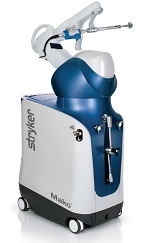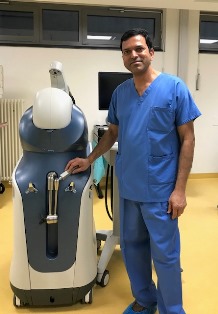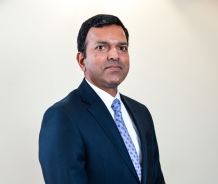Robotic-assisted joint replacement operations
Hear from our Leeds consultant orthopaedic surgeon Mr Ajit Shetty on robotic-assisted surgery: hip and knee replacements.
As featured in the Yorkshire Evening Post (4th February 2019)
"Advances in modern technology mean we can now use robotics to assist with duties traditionally done by humans. A recent development in the field of orthopaedic surgery is robotic-arm assisted hip and knee replacements.

Relatively new to the UK but well established in the USA, over 23,000 robotic-assisted total hip procedures worldwide were performed through 2016 according to Stryker – the company behind the Mako robotic-assisted surgery system I use in my private practice at Nuffield Health Leeds Hospital.
Paying for robotic-assisted surgery privately tends to be more expensive than traditional joint replacement surgery. The reason patients tend to opt for robotic-assisted surgery is for the reported better accuracy and reduction in complications. It’s ideal for people wanting to get back on their feet quickly such as the self-employed, senior professionals or those who lead a very active or sports-driven lifestyle.
Prior to the operation a personalised 3D model is created based on the patient’s CT scan, allowing the exact size and orientation of the hip or knee implant to be planned. During the operation, the robotic arm guides the surgeon, following the customised pre-surgery plan, reducing the risk of surgical errors in bone preparation and placement of the implants.
In addition to accurate positioning of hip and knee replacement components, the robotic system helps in measuring soft tissue tension, balancing ligaments and measuring leg lengths during surgery. These accuracies are important and in achieving these will ensure longevity of hip and knee replacements and better outcomes for the patient.

The Mako robotic-arm assisted technology allows the consultant to perform the joint replacement with pinpoint accuracy, the consultant however is always in control during the operation. The consultant uses the technology as an extension of his or herself, guiding surgical tools to the correct position.
It’s important to remember as with any orthopaedic surgery, post-operative rehabilitation is incredibly important and key to a quicker recovery and successful outcome. Follow your physiotherapist's advice and adhere to the exercises they set for you, this will put you on the right track for optimum recovery.
Conventional hip and knee replacements have a high success rate. Using robotic technology however, will ensure that the surgeon can consistently perform surgery with a high degree of accuracy.
Robotic-assisted surgery has been used in other specialties such as urology for sometime now and has become standard for some operations. Robotic-assisted hip and knee replacements are gaining popularity and in future I believe will become the standard of care for hip and knee replacement surgery."
Read more about our Robotic Orthopaedic Centre in Leeds
About Mr Ajit Shetty

Mr Ajit Shetty (FRCS Trauma & Orthopaedics, M.Ch Orthopaedics, M.S Orthopaedics) is a specialist hip and knee replacement surgeon at Nuffield Health Leeds Hospital. He has over 20 years of experience in joint replacement surgery specialising in complex hip and knee replacements. Mr Ajit Shetty is among one of the earlier surgeons to start using Mako Robotic-Arm assistance for joint replacement surgery in the North of England. Read more about Mr Ajit Shetty.
